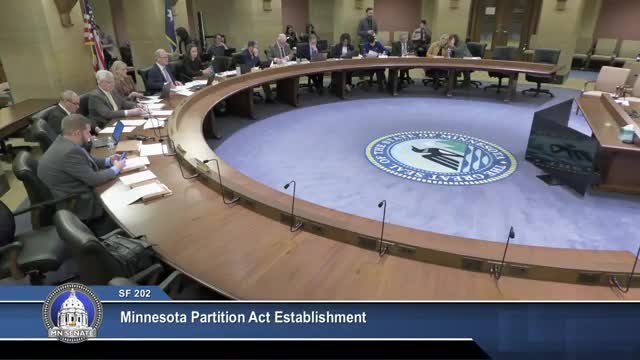Committee advances Partition Act, eminent-domain notice fixes and transfer-on-death deed corrections
Get AI-powered insights, summaries, and transcripts
Subscribe
Summary
Senate File 202, a multi-article real-property bill that updates Minnesota's Partition Act, clarifies notice and service in eminent-domain actions, and adjusts transfer-on-death deed provisions, was recommended to pass after testimony and adoption of an author's amendment.
Senate File 202, a multi-article real-property reform bill, was presented to the Senate Judiciary Committee and recommended to pass on Jan. 27, 2025.
Sponsor testimony described three main components: (1) an updated Minnesota Partition Act to modernize partition procedure; (2) procedural clarifications for eminent-domain notice and service; and (3) technical fixes to transfer-on-death deed provisions to ensure they avoid probate and to address a prior oversight about retroactivity and insurance coverage.
Sponsor Senator Crook said the Partition Act portion replaces a law last significantly updated in 1905 and modernizes practice by allowing one referee instead of three, permitting real estate agents to serve as commissioners (and be paid by commission), giving judges more discretion on costs and lien treatment, and changing the default away from physical partition in kind toward more frequent partition by sale. The bill sets an August 1, 2025 effective date for actions commenced after that date.
Kevin Dunleavy, a long-time real property testifier, told the committee the updates should make partition actions simpler and less expensive and applauded the eminent-domain notice clarifications, which he said limit notice burdens to affected parcels rather than requiring blanket service across many parcels.
The committee adopted an A2 author's amendment by voice vote and later recommended Senate File 202 as amended to pass and move to the floor by voice vote. The transcript records no roll-call tally. No public testimony for or against the bill was recorded at the hearing.
The sponsor asked the committee to ensure transfer-on-death deed technical corrections are not applied retroactively to insurance coverage issues; he said insurers were aware and not opposed to the nonretroactive approach. With the committee recommendation, SF 202 will proceed to the Senate floor for further consideration.
